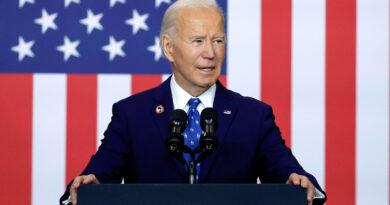RFK Jr. Unveils Commitment to “Radical Transparency” in First Address as HHS Secretary
Kennedy stated that transparency will be his strategy to tackle America’s ongoing epidemic of chronic diseases while serving as the head of the health department.
On February 18, Robert F. Kennedy Jr. pledged to initiate “a new era of radical transparency” during his first address to his staff as Secretary of Health and Human Services (HHS).
“I will not impose my beliefs on anyone here. Instead, we will work collaboratively to establish a new era of radical transparency,” Kennedy remarked. “It is only through radical transparency that we can offer Americans true informed consent, which is the cornerstone of democracy.”
Kennedy articulated that his “primary mission” at HHS is “to reverse the chronic disease epidemic.”
He emphasized that transparency will be the key to achieving this goal.
“Transparency enables various stakeholders to create a common baseline of reliable information,” Kennedy noted.
He pointed out that many government entities have become “captured by profit-driven industries” and have “languished in bureaucratic obscurity.”
Kennedy previously ran for president as both a Democrat and an independent before he concluded his White House campaign last August. After endorsing former President Donald Trump as a candidate, he launched the “Make America Healthy Again” (MAHA) movement, which focused on eliminating the nation’s chronic disease epidemic, a central theme of his presidential campaign.
Trump nominated the former Democrat for the position of HHS secretary, which required a rigorous confirmation process, culminating on February 13 with the U.S. Senate voting in favor of Kennedy, 52-48, largely along party lines. Notably, Sen. Mitch McConnell (R-Ky.) was the sole Republican to oppose Kennedy.
“For the past two decades, I have prayed each morning for God to position me to tackle the childhood chronic disease epidemic. Now, thanks to you, Mr. President, we will turn this promise into reality,” Kennedy expressed during his swearing-in ceremony on February 13 in the Oval Office.
The HHS oversees 13 agencies, which include the Centers for Disease Control and Prevention (CDC), the Food and Drug Administration (FDA), and the National Institutes of Health (NIH).
Kennedy has committed to implementing substantial changes within the department.
He has stated that not much will shift until the influence of large private corporations over the FDA, CDC, and Department of Agriculture is fully tackled.
“I recognize that it is the structure and not the individuals within it that is the core issue,” Kennedy remarked.
Transforming the agencies under HHS “will restore their credibility as reliable sources of scientific information essential for guiding policy-making, medical professionals, the public, and even global stakeholders,” he emphasized.

Robert F. Kennedy, Jr., testifies before the Senate Committee on Finance on Capitol Hill on Jan. 29, 2025. Madalina Vasiliu/The Epoch Times
“We will eliminate conflicts of interest in the committees and research collaborations whenever feasible, or ensure they are balanced with other stakeholders. We will end the revolving door to restore public trust,” he stated. “Our data and policy-making process will be so transparent that it will eliminate the need for Freedom of Information Act requests.”
Kennedy also indicated plans to “investigate” whether anti-depressant medications and childhood vaccinations are among the various “potential factors” contributing to the nation’s chronic disease epidemic.
“Nothing will be off-limits,” Kennedy assured.
“We will gather representatives from all perspectives to analyze the reasons behind the alarming surge in chronic diseases,” he said. “Some of the factors we will scrutinize have previously been considered taboo or inadequately examined.”
In his address, Kennedy referred to his recently “highly divisive confirmation process.”
He told his staff that media portrayals of him—often labeling him as an “anti-vaxxer” and a “conspiracy theorist” without fully presenting his views—have “made it difficult to understand who I am, what I believe, and what I stand for.”
“Often, when I read articles that depict me, I think to myself, I wouldn’t want to work for that person either,” he expressed.
Kennedy urged HHS employees to “develop a relationship by setting aside any preconceptions you may have about me. Let’s start fresh.”
Throughout his career, Kennedy stated that he has asked tough questions and drawn unpopular conclusions.
“I am committed to continuing to pose those challenging questions. What I can promise is to keep my preconceived answers flexible,” he indicated.
During his confirmation process, Democrats raised concerns that Kennedy would merely endorse the Trump administration’s agenda. On February 18, Kennedy asserted that his leadership would embody open-mindedness.
“I promise to be open to the possibility of being incorrect. I promise to listen to all stakeholders and all sides of the discussion, especially those with whom I’ve disagreed in the past,” Kennedy committed.
“I vow to maintain an open mind toward all possibilities and contingencies. I hope you will all join me in this promise because the health of our citizens is far more important than being right or seeking validation.”




